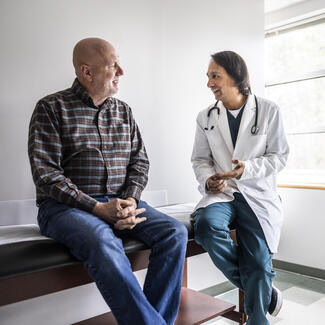The health of your brain and your body are closely linked. As a result, practicing healthy habits and actively managing your chronic conditions can go a long way in terms of protecting your brain.

The health of your brain and your body are closely linked. As a result, practicing healthy habits and actively managing your chronic conditions can go a long way in terms of protecting your brain.

Every year people on Medicare Part B can schedule an Annual Wellness Visit with their health care provider at no cost. During the visit you’ll review your overall health, discuss any medical concerns and conduct a health risk assessment.

Some key benefits of the Annual Wellness Visit:
Early Detection—Giving your doctor a chance to meet with you and discuss your needs may allow them to recommend tests, such as hearing, eyesight, memory or balance. This can reduce your risk of larger problems in the future.
Updating your Health Team—Your health care provider will share information from the Annual Wellness visit with other members of your care team, including specialists, to ensure that your care is coordinated across the whole team.
Learn more about the Annual Wellness visit from Medicare.org.
When you take care of your heart health you lower your risk of demenita.
Learn more in this video from the American Heart Association.
Vermont has several free programs to help you live a healthier life, from quit tobacco support to heart health screenings.
Family caregivers are instrumental to the health and wellbeing of individuals with dementia. They are an important member of the care team. Recognizing and supporting family caregivers is an important component of the BOLD Alzheimer’s and Healthy Aging Program. Being a family dementia caregiver is not easy, but it helps to know that you are a part of a larger community of individuals who understand the difficulties of what you may go through. There are a number of resources and programs available through the Department of Disabilities, Aging and Independent Living and the Area Agencies on Aging which are available to serve every Vermonter aged 65 and older.
Resources and support for Caregivers
Resources and support for Health Care Providers
The Alzheimer’s Disease and Healthy Aging Program administers the Centers for Disease Control's (CDC) BOLD grant in Vermont. BOLD stands for “Building Our Largest Dementia infrastructure.” The grant is helping to build the groundwork in the state to address dementia as a public health priority.
The first BOLD award to the Department of Health, Division of Health Promotion and Disease Prevention (HPDP) started in September 2020 and awarded $250,000 annually for three years. It ended in September of 2023.
The grant enabled us to build a statewide coalition with community-based organizations and health systems to begin addressing this emerging public health priority. Our Vermont Action Plan for Alzheimer’s Disease, Related Dementias and Healthy Aging laid the groundwork for future activities.
In late 2023, the Alzheimer’s Disease and Healthy Aging Program received a five–year Cooperative Agreement from the CDC to support the statewide implementation of a public health approach to: